Disclosure: Meeple Mountain received a free copy of this product in exchange for an honest, unbiased review. This review is not intended to be an endorsement.
On a recent Saturday night, I had the chance to play Magnate: The First City from Naylor Games then play Origins: First Builders from Board&Dice immediately after. Despite being completely different games in almost every way, one thing really stuck out:
Apparently, I enjoy variable round end-game condition games quite a bit.
In Magnate: The First City, the end might come after 3 rounds, or 5, or maybe 9; it’s all about when a random selection of Risk cards determines when the housing market crashes. In Origins: First Builders, there are 4 different ways a game can end, and if your brilliant plan to score the majority of your points comes a round too late, you will crash and burn. You may try to string out the game to ensure you can execute your plan. In other cases, you might try to speed the ending, once you see other players shaping up for big plans in later rounds.
With that framing our discussion today, Origins: First Builders is not original. Designed by Adam Kwapinski (Nemesis), there’s not a single thing I will call out that is wholly unique. It doesn’t possess world-class production elements and certainly misfires from time to time.
But that twist on how games end—a determinate number of rounds would really change how players plan—gives Origins: First Builders a slight edge. The game provides an enjoyable experience for strategy gamers looking for a challenge in the higher end of midweight decision space.
So if you like a good “Euro” design, dice, and motherships, I have a game for you!
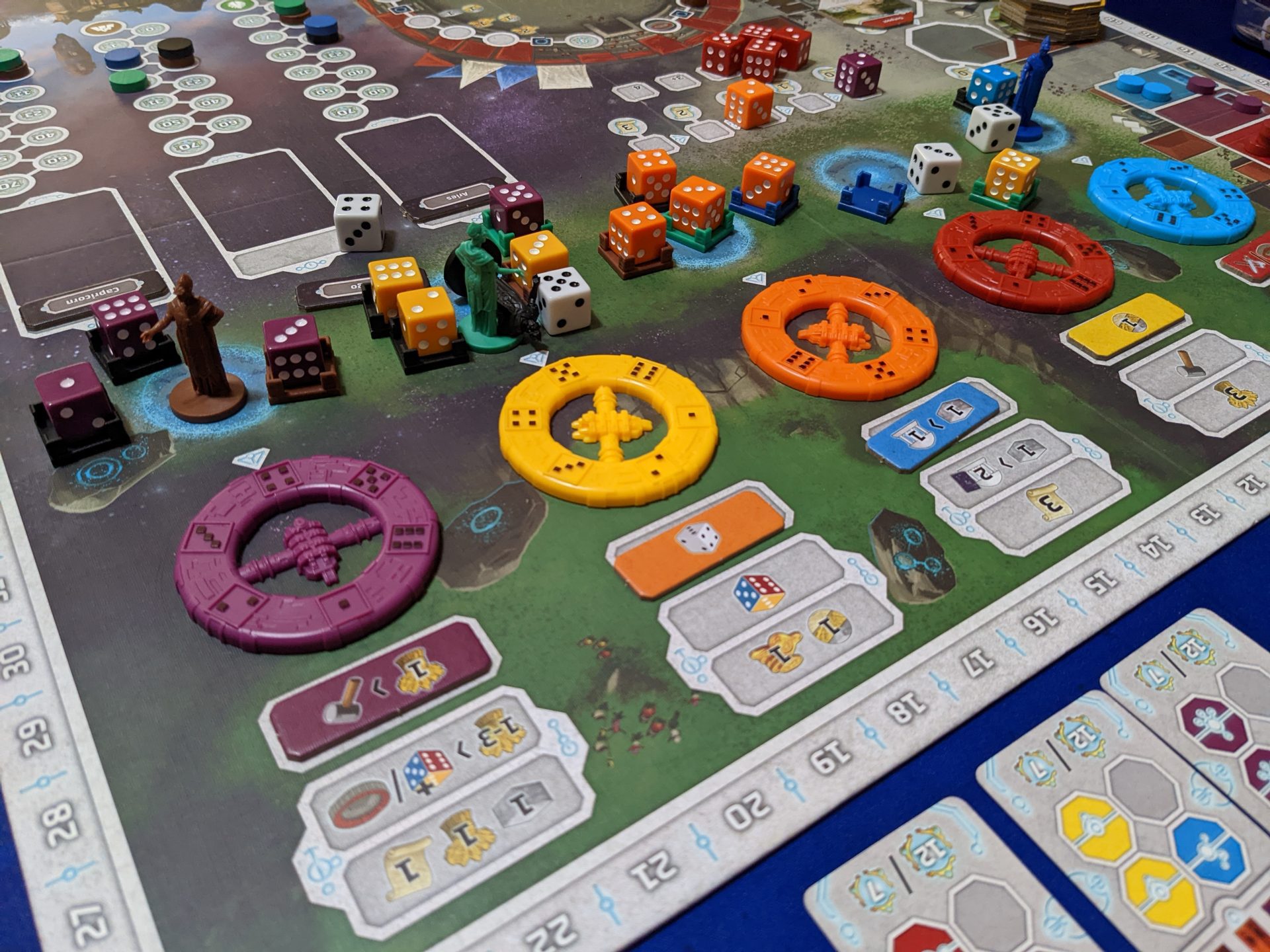
The Eurogame Design Potpourri
I’m guilty of using the term “Eurogame” to describe way too many games, even to people who are familiar with what the term means.
So, let’s start there: what is a “Eurogame”? Often referred to as just Euro for short, a Eurogame originates from what many German-designed games from the 1960s, 70s and 80s offered to the world: efficiency-based engine builders, indirect player interaction (as opposed to direct, often combat-focused gameplay), a complete lack of dice and other chance-based processes, and themes which often disguise abstract gameplay mechanisms.
Some of the more famous Eurogame designs, such as Settlers of Catan (now, just Catan), Puerto Rico, and Agricola, are classics because they balance excellent mechanics but are also a ton of fun to play. These games are also usually very compact in terms of duration; most games of, say, Grand Austria Hotel can be finished in under 2 hours, maybe a lot less.
Origins: First Builders has almost everything you’d expect out of a Eurogame. I’m supposed to be an Archon, guiding my new futuristic civilization through history, but that’s just a cover for the fact that I have dice, and those dice need somewhere to go. There is a Military track for fighting, but you’ll never actually fight anyone. Similar to Terra Mystica, or hundreds of games like it, there are temple tracks, and advancing on these tracks grant a player points and additional game-breaking player powers.
There are worker placement spaces to dictate the actions you can take on a turn. There are public goals, which all players work towards to score major points. There’s tableau building as players create their city. Origins: First Builders does feature dice, albeit dice that are mostly not rolled. Instead, they are aged from one round to the next (similar to a mechanic in games like Teotihuacan), giving you more powerful options in later rounds.
Origins: First Builders features almost every single tenet of the Eurogame category. Despite the lack of originality, I love it.
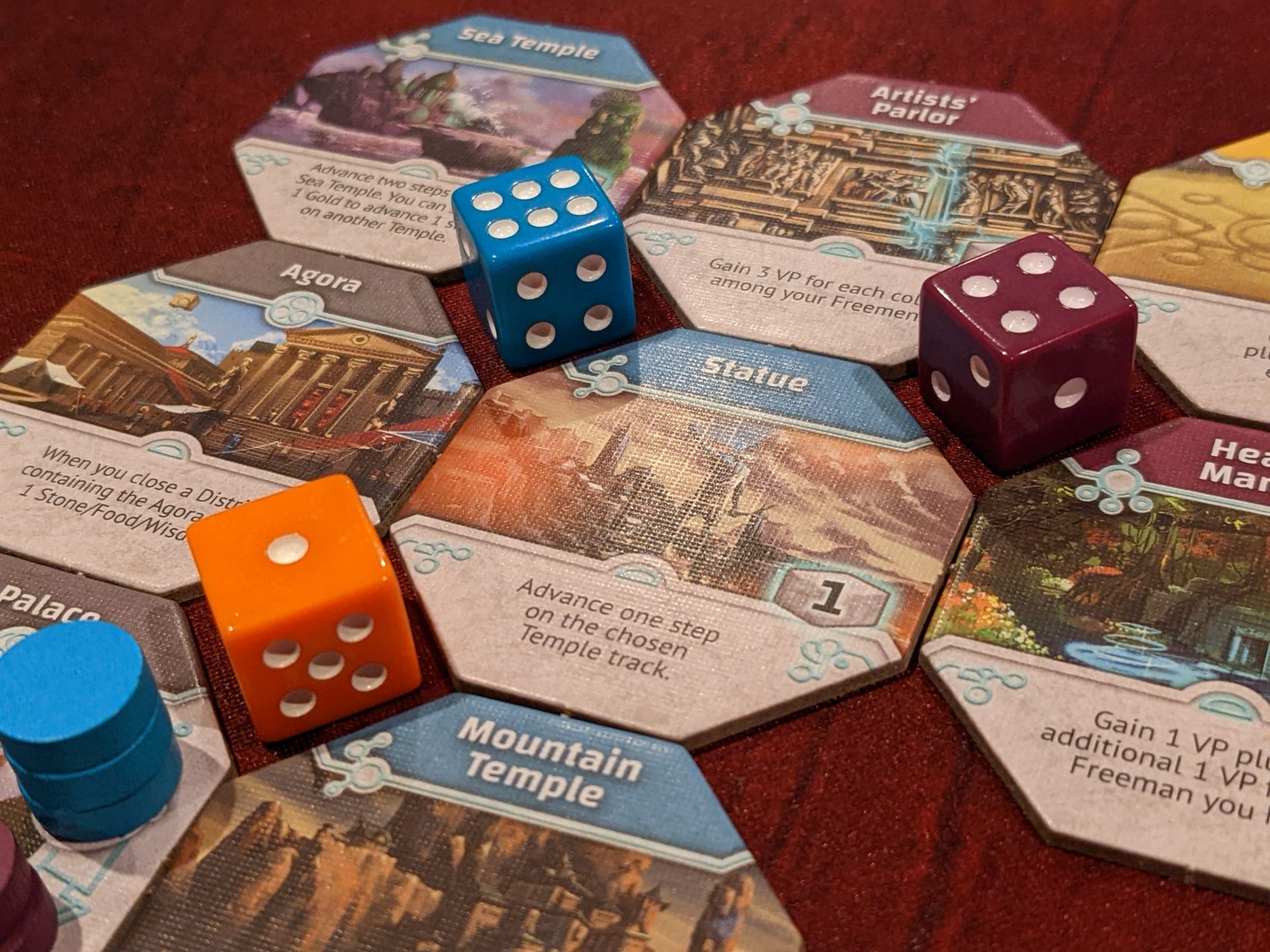
Originality is for the Birds
With thousands of games coming out every year, I’m shocked how often friends, publishers and critics talk about originality. When something truly unique comes my way, sure, it’s really cool.
That doesn’t mean that the vast majority of other games coming out each year aren’t worthy of praise for embracing what’s worked for so long. Origins: First Builders is so un-original it wouldn’t shock me if that was the goal all along, and I have no problem with that. The game is just fun.
Many of the gamers in one of my gaming groups absolutely love dry, themeless, midweight Euros. In fact, we have a running joke that the game Lignum, which is about the process of literally drying wood in the logging industry of the 1800s, is the perfect amalgamation of the kind of games we enjoy. We love tracks. We love engine builders. We love tableaus. We like the presence of dice without breaking the game by being required to roll those dice for successes. We like talking, drinking, and hanging out, but it’s OK if the game doesn’t allow for head-to-head combat options.
Racing opponents to achieve milestones? Yes! Worker placement mitigation using resources gathered on previous turns? Yes! Bonuses tied to matching actions to using the proper color dice? Yes! End-game scoring tied to scoring only the lesser 2 of your 3 track scores? Oh baby!!
Just doing the teach for Origins: First Builders with some of these gamers got their juices flowing. I could tell I had at least one of them on the hook when I told him that once your workers—each “Citizen” is known as a “Freeman”, a die which sits in a die holder known as your “Population”—eventually turn into a 6-pip die, they can do even cooler things when moved to a worker placement spot on the board.
“This is right up my alley,” he said. Once a Eurogamer, always a Eurogamer. And Origins: First Builders is going to make Eurogamers very happy.
Turns are quick; you’ll place Freemen on action spaces to do things like gather resources, move up tracks, or build buildings. You’ll add buildings to your tableau, triggering one-time bonuses. Each player’s tableau will have buildings orthogonally connected, and when a cluster of 4 is built, you can close that cluster with a Freeman moved into that cluster’s “Seat of Power”, which just means more chances to trigger those building bonuses again if the die color matches the color of any tiles in that cluster. You’ll add Population bases to hold more dice. You can even spend the game’s wild resource, gold, to add discs to your home Palace tile, to trigger better multipliers for your Seat of Power dice.
And the Eurogamer point buffet only gets richer from there.
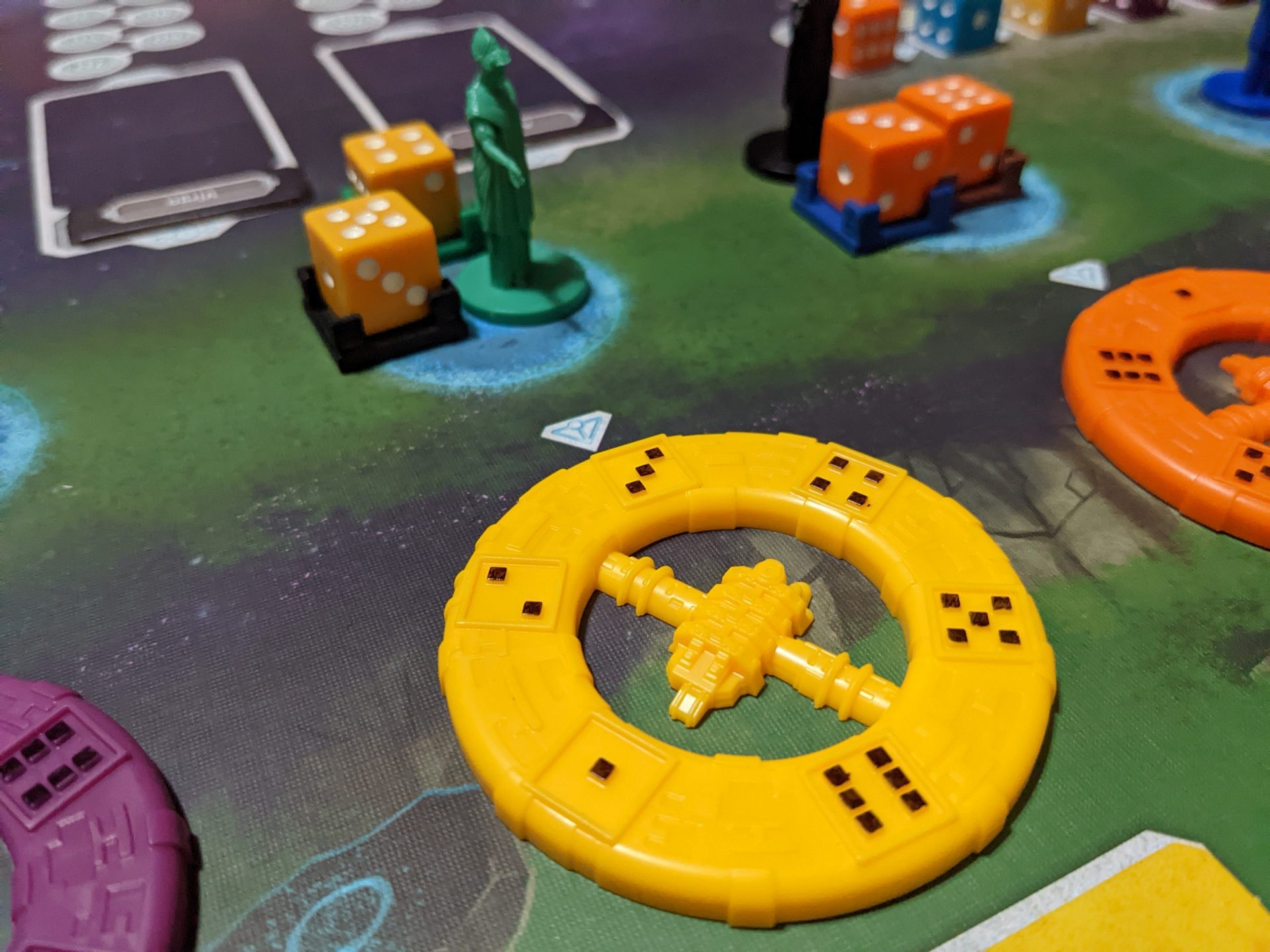
One Man’s Trash
While everything I’ve listed above is a treasure, some parts of Origins: First Builders are definitely trash.
I’m a production guy. I like Lacerda games because I like top-tier components. Just say the words “Game Trayz” and you have my attention. Geek-Up bits? I’m listening. “Deluxe Edition”? Depending on the price, I’m probably going to back it.
Board&Dice doesn’t even bother with an insert for Origins: First Builders. There is a board, lots of cardboard, dice, and plastic motherships, all just dumped into the box. Those motherships? Players need to be able to read them from across the table, but Board&Dice made a curious decision to not color or really accentuate the pips on each space of the motherships. This means that a critical portion of gameplay—knowing which Freemen you can send to which worker placement spots—often requires one player to call out to everyone else the current number of pips showing. (During my third play of this game, one player broke out a fine-tip Sharpie and colored in the pips on each mothership. Game changer!!)
The resource tokens are a complete miss. All 4 of the resources in Origins: First Builders—wisdom, stone, food, and gold—somehow look nearly identical, and it feels like there are never quite enough of the tokens. If you’ve completed your Charterstone campaign and kept the massive box of meeples and resources, I would consider using those for a game like Origins: First Builders; you could also wait for BGG’s team to come up with cool Geek Up toys to replace everything in the base game.
The most offensive miss is something I’m sure the Board&Dice team did not consider during playtesting: colorblind players. One of the folks in my gaming group is colorblind and, in his words, Origins: First Builders was a “nightmare” when it came time to decipher specific colors. The motherships, Tower discs, and building types come in purple, blue, red, orange and yellow. On more occasions than I can count, this player couldn’t clearly decipher which buildings he could play to get the district card bonuses. He regularly couldn’t tell which color die was what. Some of these iconography issues are easy to solve, some harder, so I won’t pretend that this would be an easy fix. But Origins: First Builders was really difficult on his eyes and I’m guessing he won’t be the only player sharing these issues.
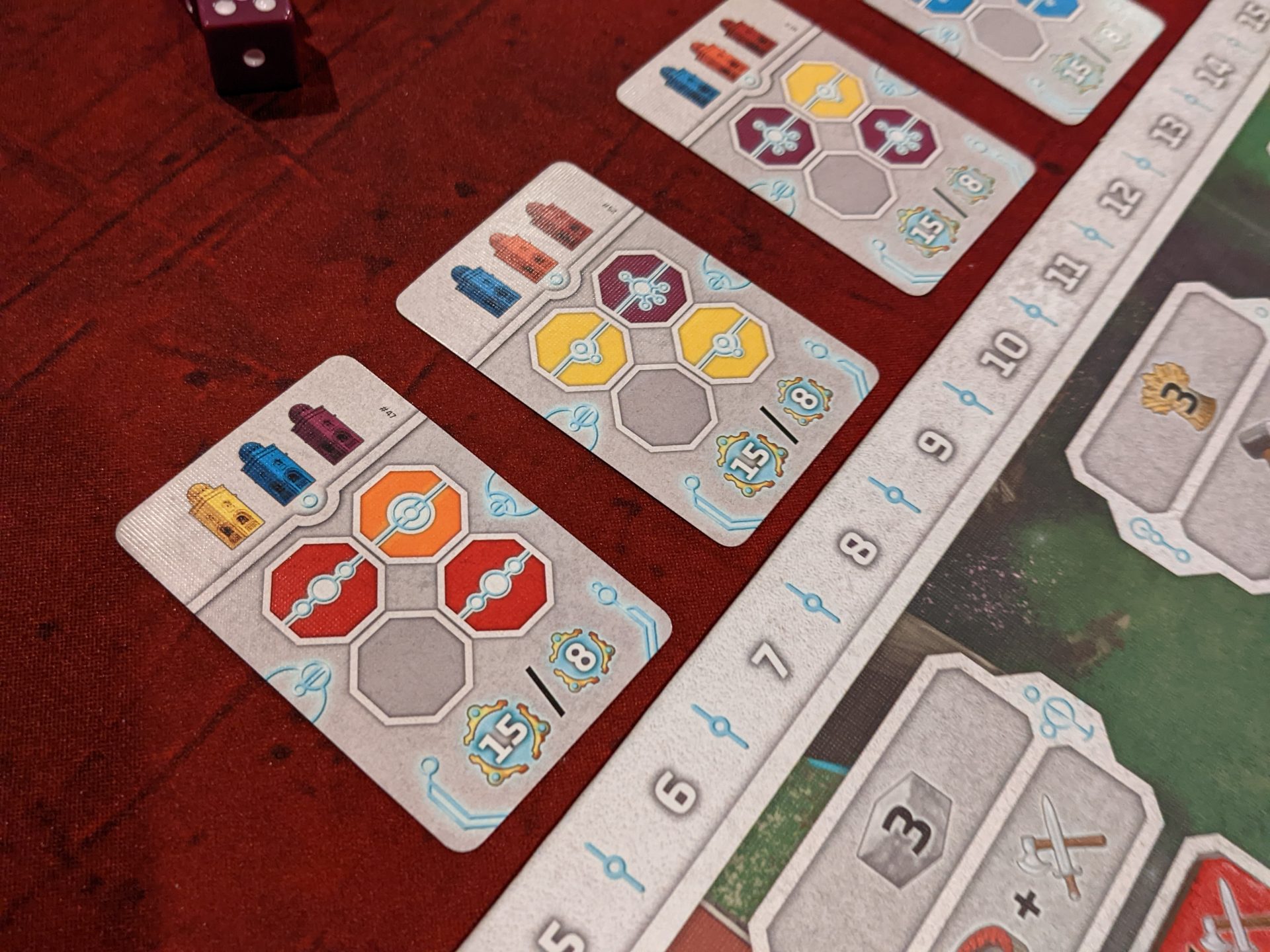
That Said…
Origins: First Builders gets the one thing right I ask of all games: is it fun?
I can wholeheartedly say yes. The game isn’t original, butI don’t care. Some of the other reviews I have watched and read indicate that Origins: First Builders should just be called “Torigins”, to celebrate the relationship Board&Dice and designer Daniele Tascini share for many of the “T” games released in recent years, such as Tekhenu and Teotihuacan. (Tascini is credited with a special thanks from the designer in the rulebook for Origins: First Builders.)
The difference between Origins: First Builders and those “T” games is that the weight here is a little lower, meaning Origins: First Builders is a much more accessible Eurogame. It’s pretty easy to teach, there are a bunch of fun combos that surface throughout gameplay, and it doesn’t overstay its welcome thanks to the variable end-game conditions mentioned previously. I’ve pursued multiple paths to victory and there’s a lot of variety in the base game, which always makes me feel better that a game wasn’t being built solely with expansion content in mind.
Origins: First Builders does come with a couple of reservations. There are bonus actions tied to each color of mothership, and a couple of them feel plainly better than the others. For example, the orange bonus action is to take an extra die, a “Speaker”, essentially contractors that can be used for that round only. However, a different bonus lets you pay one wisdom to move up a single space on one of the Zodiac tracks. That one has not been used often in my plays.
My hope is that expansion content offers more variety in this bonus tile selection. More powers in the Zodiac track area would also help, although this one is tougher: there are only 12 Zodiac signs in real life, and 12 cards included in the game. Like the bonus tile situation, some of these gamebreaking powers seem plainly better, and more commonly beneficial, than others.
One process of the otherwise excellent rulebook that I’m not sold on: turn order. Each round, turn order is set by checking the leader on the Military track. By “set”, I mean the leader takes the first player token, then play goes clockwise from that player around the table, and not by placement on the Military track. That means if you are seated to the left of the military player, no matter how far down the track you are from the leader, you are going second in that round.
We house-ruled this for our third 4-player game of Origins: First Builders by using Military track order for turn order, meaning we had to be a little more intentional about remembering whose turn it was since we sometimes had to zigzag around the table. I’m not sure how that would play out over dozens of plays, but turn order is a consideration and certainly important. (In that game, the player who went fourth most of the game because he was last in Military track order blew us off the table, so for my one and only play with this rule change, the evidence is not conclusive!!)
Otherwise, Origins: First Builders is a smooth Eurogame that checks most of my boxes. Similar to my thoughts on Khôra: Rise of an Empire, Origins: First Builders is a game that will be easy to get to the tables of my gaming groups!


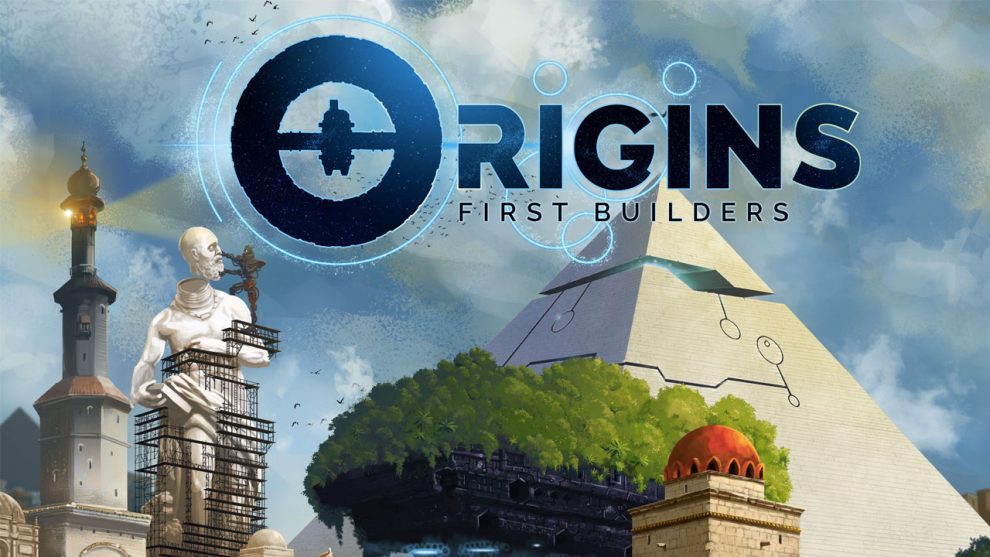


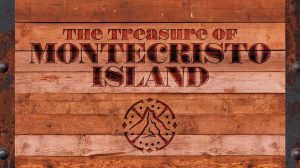






Add Comment